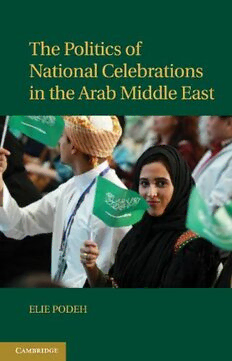
The Politics of National Celebrations in the Arab Middle East PDF
Preview The Politics of National Celebrations in the Arab Middle East
The Politics of National Celebrations in the Arab Middle East Why do countries celebrate defining national and religious moments or significant events in their history, and how and why do their leaders select certain events for commemoration and not others? This book is the first systematic study of the role of celebrations and public holidays in the Arab Middle East from the fall of the Ottoman Empire to the present. By tracing the history of the modern nation-state through suc- cessive generations, the book shows how Arab rulers have used public holidays as a means of establishing their legitimacy and, more broadly, a sense of national identity. Most recently, some states have attempted to nationalize religious festivals in the face of the Islamic revival. With its many illustrations and copious examples from across the region, the book offers an alternative perspective on the history and politics of the Middle East. Elie Podeh is Professor of Islamic and Middle Eastern Studies at the Hebrew University of Jerusalem. His publications include Britain and the Middle East, co-edited with Zach Levey (2008), Arab–Jewish Relations from Conflict to Resolution?, co-edited with Asher Kaufman (2005), Rethinking Nasserism: Revolution and Historical Memory in Modern Egypt, co-edited with Onn Winckler (2004), and The Arab– Israeli Conflict in Israeli History Textbooks, 1948–2000 (2002). The Politics of National Celebrations in the Arab Middle East EliE PodEh Hebrew University of Jerusalem cambridge university press Cambridge, New York, Melbourne, Madrid, Cape Town, Singapore, São Paulo, Delhi, Tokyo, Mexico City Cambridge University Press 32 Avenue of the Americas, New York, ny 10013-2473, usa www.cambridge.org Information on this title: www.cambridge.org/9781107001084 © Elie Podeh 2011 This publication is in copyright. Subject to statutory exception and to the provisions of relevant collective licensing agreements, no reproduction of any part may take place without the written permission of Cambridge University Press. First published 2011 Printed in the United States of America A catalog record for this publication is available from the British Library. Library of Congress Cataloging in Publication data Podeh, Elie. The politics of national celebrations in the Arab Middle East / Elie Podeh. p. cm. isbn 978-1-107-00108-4 (hardback) 1. Holidays – Middle East – History. 2. Festivals – Middle East – History. 3. Nationalism – Middle East – History. 4. Arabs – Social life and customs. 5. Middle East – Social life and customs. 6. Middle East – Politics and government. I. Title. gt4873.a2p64 2011 394.2600956 – dc22 2010053216 isbn 978-1-107-00108-4 Hardback Cambridge University Press has no responsibility for the persistence or accuracy of urls for external or third-party Internet Web sites referred to in this publication and does not guarantee that any content on such Web sites is, or will remain, accurate or appropriate. What is a rite?” asked the little prince. “Those also are actions too often neglected,” said the fox. “They are what make one day differ- ent from other days, one hour from other hours. There is a rite, for example, among my hunters. Every Thursday they dance with the village girls. So Thursday is a wonderful day for me! I can take a walk as far as the vineyards. But if the hunters danced at just any time, every day would be like every other day, and I should never have my vacation at all.” Antoine de Saint-Exupéry, The Little Prince [King] Admetus: [T]o the citizens and to the whole region of my four cities, I now give orders to raise choruses for these happy events and to fatten the altars of the gods with prayer and the sacrifice of bulls. For now we have taken on a better life than before. I will not deny that I am blessed by fortune. Euripides, Alcestis, line 1154 Contents List of Figures page viii Preface xi Introduction 1 1. Celebrating Nation and State: A Theoretical Framework 9 2. Celebrations and Ceremonies in Arab–Islamic Lands 34 3. Egypt: Changes within Continuity 55 4. Iraq: Changing Regimes, Changing Celebrations 108 5. Jordan: Preserving Invented Traditions 168 6. Lebanon: Upholding the Integrity of the State 207 7. Saudi Arabia: Between Religious and Secular Holidays 255 Conclusions 285 Bibliography 305 Index 327 vii Figures 3.1 Egypt: Holiday of National Struggle page 79 3.2 Egypt: Evacuation Day 82 3.3 Egypt: Revolution Day 85 3.4 Egypt: The October 1973 celebrations 89 3.5 Egypt: Laying wreaths at Sadat’s tomb 90 3.6 Egypt: The October 1973 celebrations 100 4.1 Iraq: Saddam Husayn 133 4.2 Iraq: Emblem of Martyr’s Day 136 4.3 Iraq: Martyr’s Day 137 4.4 Iraq: Saddam and Martyr’s Day 138 4.5 Iraq: Scene from Martyr’s Day 139 4.6 Iraq: Bay‘a Day 140 4.7 Iraq: Bay‘a Day 141 4.8 Iraq: Victory Day 143 4.9 Iraq: Saddam Husayn’s birthday 147 4.10 Iraq: Religious holiday 151 4.11 Iraq: Shi‘i holiday 157 5.1 Jordan: ‘Abdallah’s Independence Day 172 5.2 Jordan: King Husayn’s Silver Jubilee 180 5.3 Jordan: Husayn’s Independence Day 187 5.4 Jordan: The “Jordan First” policy 194 5.5 Jordan: ‘Abdallah II’s coronation 194 viii Figures ix 5.6 Jordan: Sixtieth anniversary 197 5.7 Jordan: Succession line on Independence Day 202 5.8 Jordan: ‘Abdallah’s accession anniversary 204 6.1 Lebanon: Martyrs’ Day 230 6.2 Lebanon: Martyrs’ statue 232 6.3 Lebanon: Army Day emblem 235 6.4 Lebanon: Resistance and Liberation Day 243 7.1 Saudi Arabia: Succession line 259 7.2 Saudi Arabia: Bay‘a ceremony 268 7.3 Saudi Arabia: The centennial emblem 277 7.4 Saudi Arabia: King ‘Abd al-‘Aziz 278
